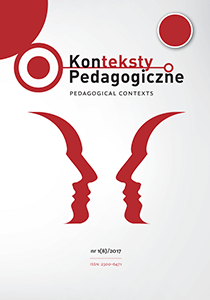Abstract
This document presents the components of the professional devel-opment of pre-primary school teachers, in which the teacher plans her own professional development in educational fields. These are based on the teacher’s conscious educational needs stemming from her self-reflection on her profes-sional activities. A teacher’s preparatory pedagogical education plays an impor-tant role in pre-primary school teacher professional development planning. One of the forms of preparatory pedagogical education leading to the profession of pre-primary school teacher is study at a higher education institution/university. This form of study has been included in our investigation. At this institution, we investigated the expressed educational needs that represent the content of the professional development plan of students in the third year of combined study in pre-primary school education. This professional development plan includes students’ statement of educational fields in which they have a need for further education following the completion of their studies. The educational needs of students were investigated in relation to the length of their pedagogical expe-rience. Our aim was to determine specific educational fields for the students’ professional development plan, for which we assumed that the structure of the educational fields in relation to the length of their work experience would be dis-parate. We also investigated the source of their educational needs, e.g. the forms and methods of their self-reflection on their professional activities. We were furthermore interested in the obstacles that they face in the implementation op-portunities of their professional development plan.
References
Burkovičová, R. (2008). Přípravné vzdělávání učitelů mateřských škol. Ostrava: Univer-sity of Ostrava in Ostrava, Pedagogical Faculty.
Burkovičová, R. (2013). Obtížnost profesních činností v učitelství pro mateřské školy.Ostrava: University of Ostrava, Pedagogical Faculty.
Kariérní systém (2015). Prague: National Institute for Further Education, http//rizeni-veskolstvi.cz/resources/A5-karierní%20system.pdf.
Kasáčová, B. et al. (2011). Učiteĺ preprimárného a primárného vzdelavania. Bánská Bystrica: Matej Bel University Banská Bystrica Faculty of Education.
Kohnová J. (2004). Další vzdělávání učitelů a jejich profesní rozvoj. Prague: Charles University, Faculty of Education.
Kohnová, J. (2012). Profesní rozvoj. Sborník příspěvku z konference. Prague: Charles University, Faculty of Education, KREACE, s.r.o.
Nezvalová, D. (2003). Pedagogické kompetence, standardy a kvalita v pregraduální přípravě učitele. Pedagogická orientace, 4.
Smolíková, K. et al. (2004). Rámcový vzdělávací program pro předškolní vzdělávání. Pra-gue: VÚP.
Švec, V. (1995). Význam diagnostiky učitelova pjetí výuky v jeho pregraduální přípravě. Pedagogika, 40 (2).
Syslová, Z. (2013). Profesní kompetence učitele mateřské školy. Prague: Grada Publishing,a .s.
Vašutová, J. (2004). Profese učitele v českém vzdělávacím kontextu. Brno: Paido.
In accordance with the recommendation of the Ministry of Science and Higher Education, which aims to counteract the practice of “ghostwriting” and “guest authorship,” all authors submitting their text for publication should attach an author’s statement which declares the contribution of each of the authors to the article. The printed and signed statement should be delivered by mail or other means to editor-in-chief Joanna Skibska or sent in the form of a scan to the following e-mail address: redakcja@kontekstypedagogczne.pl. The authors will not receive remuneration for publishing their papers. The editors reserve the right to make minor editorial changes to the articles which will not affect the substance of the article. We encourage all authors to prepare their articles in accordance with the guidelines for manuscript preparation. Download pdf file.
Authors transfer all copyrights and grant the journal the right of first publication with the work simultaneously licensed under a Creative Commons Attribution License that allows others to share the work with acknowledgement of the work's authorship and initial publication in this journal. All authors agree to the publishing of their email addresses, affiliations and short bio statements with their articles during the submission process.

